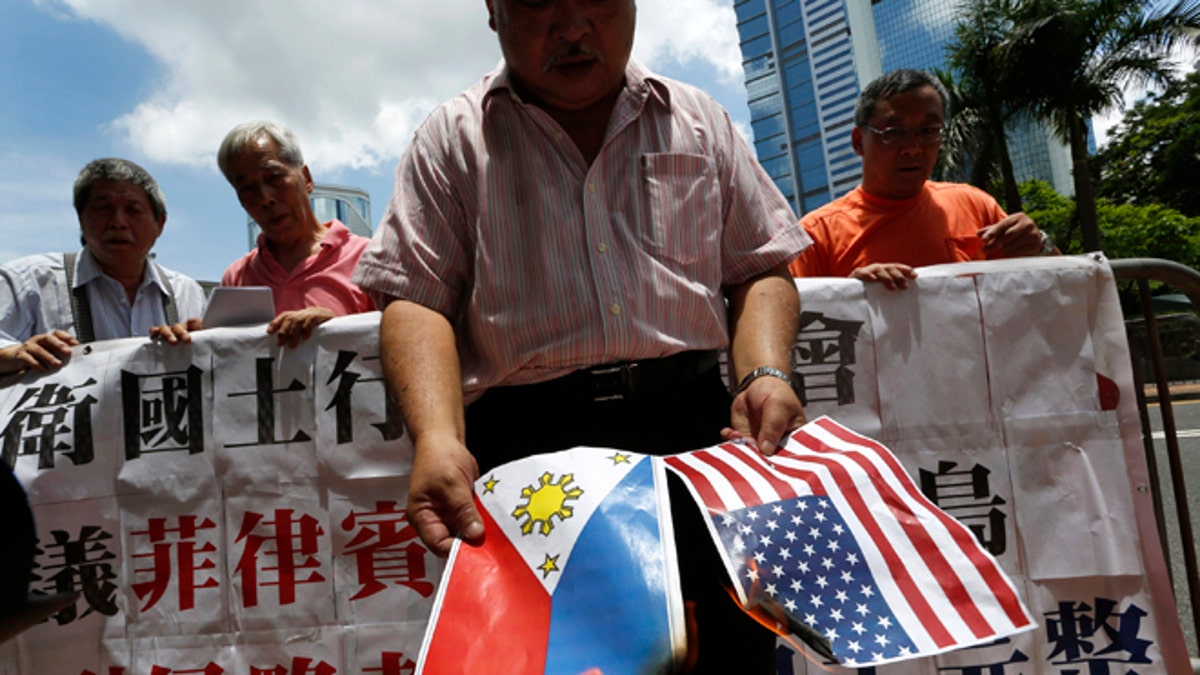
May 10, 2012: A protesters burns a Philippine flag and a U.S. flag during a protest outside the Philippines Consulate in Hong Kong. (AP)
The dispute between China and the Philippines over the countries' maritime boundaries seems to have moved to a much more dangerous level -- and could soon include the United States.
China is now warning of a potential war with its Asian neighbor.
"No matter how willing we are to discuss the issue, the current Philippine leadership is intent on pressing us into a corner where there is no other option left but the use of arms," said an editorial in the state-controlled China Daily newspaper.
The dispute is over a small group of islands called the Scarborough Shoal off the northwestern Philippines that both nations claim as their territory.
Last month, a tense standoff took place between navies of both countries, after military vessels from the Philippines tried to stop a Chinese fishing fleet from entering the territory.
Non-military ships from both nations remain in the area to enforce their claim.
The shoal is about 140 miles from the coastline of the Philippines, which insists its claim is supported by international law.
The nearest Chinese-controlled land mass is several hundred miles away.
But China claims most of the South China Sea. Its claim spreads far to the southeast and includes waters very close to other Asian nations, such as Brunei, Indonesia, Malaysia and Vietnam.
It is thought the South China Sea has vast quantities of oil and gas beneath it and all of these nations want to stake their claim.
It's also a widely perceived as a potential flashpoint between the countries; it is also a major international waterway of the United States, which uses it to have its fleets pass through to the Middle East.
China announced today it was suspending all tours of the Philippines by Chinese nationals because of the risk, it says, for their safety.
Meanwhile, a demonstration against China is to be staged outside the Chinese Embassy in the Philippines capital Manila on Friday.
The Chinese Embassy has also warned its citizens to stay off the streets.
China also says it will be checking more stringently all deliveries of fruit imports from the Philippines. China is its largest market for fruit products, such as bananas.
Both actions look also to be an attempt to put economic pressure on the Philippines.
China has always wanted to make any negotiations about the area on a bilateral basis rather than make it an international issue that would bring in other nations, including the United States.
The Philippines has also said it wants to negotiate, but Foreign Secretary Albert del Rosario has also warned of China's looming threat to freedom of navigation.
Now, though, it seems China is warning that it's prepared to take military action if the Philippines doesn’t back down.
The PLA Daily, the official newspaper of the People's Liberation Army of China, ran an article titled, “Don’t Attempt to Take Away Half an Inch of China’s Territory”over the Scarborough Shoals or, as China calls it, Huangyan Island.
"We want to say that anyone's attempt to take away China's sovereignty over Huangyan Island will not be allowed by the Chinese government, people and armed forces," the newspaper said in the article.
Poornima Subramaniam of IHS Global Insight told Fox News that a shooting war would be a no-contest situation. “A military confrontation between the two militaries would be a total mismatch. The Philippine Navy’s combat or even patrolling capabilities are no match to that of the PLA Navy. The fact that the Philippine Navy’s capability was greatly enhanced by the 44-year-old former US Coast Guard cutter, when it became the PN's flagship, illustrates the navy's inherent weakness and its inability to maintain a credible fleet.”
The Philippines has, though, been touting its alliance with the United States during the dispute.The two countries had planned a joint military exercise in the South China Sea last month.
China has been watching the growing presence of the U.S military in the region and analysts suggests this latest dispute is linked to the joint exercise, which involves dealing with terrorists who have taken over an oil rig in the South China Sea.
But the Philippines should be not expect help from the U.S. if it turns into a shooting war, says Subramaniam.
“Given this capability gap, the Philippines knows it has a lot to gain through alliance with the U.S. But any hope that the U.S. would provide 'cover' from China over disputed maritime borders in the South China Sea, in case of a military conflict, is unlikely to be met, as there is little for Washington to gain by openly siding with Manila in any dispute with Beijing.”
China has been prepared to support its claims in the South China Sea with military action in the past.
In 1974, China and Vietnam fought a short battle over the Paracel Islands in the South China Sea, a battle that China won.
Despite the rhetoric coming out of China at the moment of backing up its territorial claims by force, it's still questionable if it wants to cause an international crisis now while it continues to grow economically and militarily.







































